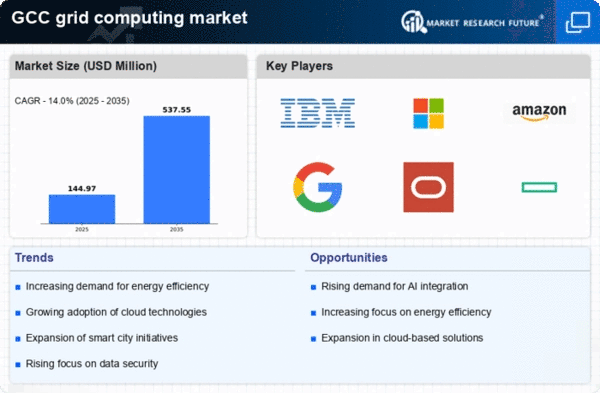Rising Cybersecurity Concerns
As the grid computing market expands, so do the concerns surrounding cybersecurity. Organizations in the GCC are increasingly aware of the vulnerabilities associated with data sharing and distributed computing environments. This heightened awareness is prompting investments in robust security measures to protect sensitive information. The market for cybersecurity solutions is expected to grow by approximately 20% annually. A significant portion of this growth is attributed to the need for secure grid computing infrastructures. Consequently, the integration of advanced security protocols within grid computing frameworks is becoming a priority, thereby influencing the overall dynamics of the grid computing market.
Government Initiatives and Support
Government initiatives in the GCC are playing a pivotal role in shaping the grid computing market. Various national strategies aim to promote digital transformation and innovation, thereby fostering an environment conducive to the adoption of grid computing technologies. For instance, initiatives such as Saudi Vision 2030 and the UAE's National Innovation Strategy emphasize the importance of advanced computing solutions in driving economic diversification. These government-backed programs are likely to allocate substantial funding towards research and development in grid computing, potentially exceeding $500 million in the coming years. Such support not only enhances the technological landscape but also encourages private sector participation in the grid computing market.
Advancements in Network Infrastructure
Advancements in network infrastructure are significantly impacting the grid computing market. The deployment of high-speed internet and improved connectivity solutions across the GCC is facilitating seamless data transfer and communication among distributed computing resources. This enhanced infrastructure is crucial for the effective functioning of grid computing systems, enabling organizations to harness the full potential of distributed computing. With investments in network upgrades projected to exceed $2 billion by 2027, the grid computing market stands to benefit from these developments. Improved network capabilities are likely to enhance the performance and reliability of grid computing solutions, further driving market growth.
Increased Collaboration Among Enterprises
Collaboration among enterprises is emerging as a key driver in the grid computing market. Companies in the GCC are recognizing the benefits of pooling resources and sharing computing power to tackle complex challenges. This collaborative approach not only enhances efficiency but also reduces operational costs. For instance, joint ventures in sectors such as research and development are likely to leverage grid computing to optimize resource utilization. Cost savings for participating organizations could reach up to 30%, making collaboration an attractive proposition. As more enterprises adopt this model, the grid computing market is expected to witness substantial growth.
Growing Demand for High-Performance Computing
The grid computing market is experiencing a surge in demand for high-performance computing (HPC) solutions across various sectors in the GCC. Industries such as oil and gas, healthcare, and finance are increasingly relying on HPC to process vast amounts of data efficiently. This trend is driven by the need for real-time analytics and complex simulations, which are essential for decision-making. According to recent estimates, the GCC region's investment in HPC technologies is projected to reach approximately $1.5 billion by 2026, indicating a robust growth trajectory. As organizations seek to enhance their computational capabilities, the grid computing market is poised to benefit significantly from this growing demand for HPC solutions.
















